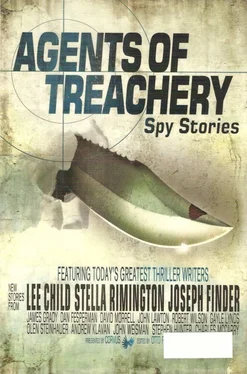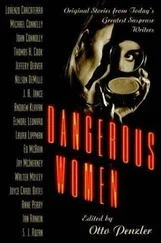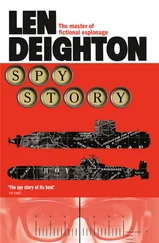As he walked back to his car, he rummaged through his pocket and came up with a pack of Winstons. He lit one and inhaled deeply. It was the first one he’d had in three days; he was doing well.
When you’re being watched, all your actions, however small, take on a presence of their own-each has its own significance and its own variety of interpretations. You light a cigarette, and that might mean that you’re nervous, you’re relaxed, you’ve been co-opted by Western forms of decadence, or that you’re desperately stopping time in order to invent your next lie.
He had to stop thinking this way. If Ansar al-Islam was watching, the only important detail was the taking of Sam Matheson. They would know that Aslim Taslam left hesitation to those with less faith.
***
Nabil took Sam Matheson’s dry, surprisingly heavy hand from the table and dropped it back into the crumpled plastic bag, then slipped the bag into the pocket of his jacket as Kwambai fed Paul Fisher the lie: “Your suitcase, yes, full of clothes-you hadn’t even unpacked. But no magical computer.”
Nabil disagreed with this tactic, but Kwambai had been living with the doublespeak of politics for too long. He no longer knew how to be straight, and now he’d gone over the deep end. Yesterday’s evidence had been irrefutable. Nabil had returned from the market, having stopped at a mosque along the way to offer his Asr prayer. After Sam Matheson, he’d felt the need for some community. He’d driven up the hill to find Ghedi in the driveway, looking distraught. “He killed him,” Ghedi said. “Kwambai killed the American.”
Kwambai explained himself as they stood over Sam Matheson’s corpse in the basement. “He saw me. Your men brought him through the living room without a hood and he saw me. I couldn’t let him live.”
Kwambai had put two bullets in Sam’s chest and one through his neck; sticky blood covered the floor, and the flies had already begun to swarm. Standing over him, the politician began to tremble all over. It was probably the first man he’d ever killed with his own hand. Kwambai said, “His fingerprints. He said we’ll need them for the computer.”
“Why did he say that?”
“He thought it would save his life.”
“So you had a conversation first?”
The politician seemed to have run out of words, so Nabil asked Ghedi and Dalmar to remove the American’s hands while he took Kwambai outside and they looked for a spot to bury him among the low, dry trees in his backyard. Together, they dug a deep hole. Nabil stopped once, asked where east was, and kneeled in the dirt to offer his Maghrib prayer, while Kwambai ran into the house for more drink. By the time they finished, it was dark. All four men carried the body to the hole, and then Ghedi and Dalmar were given the unenviable task of cleaning the basement room.
Over those later hours, as they filled the hole and stumbled back to the house, Kwambai’s drunkenness faded and was replaced by a strange giddiness. He talked about the act he’d committed, the feel of the pistol, the kick of the bullet as it left the chamber, the American’s stunned eyes that slowly lost their sheen. He described these things as a man describes his first time with a woman, with the pleasure of a wonderful thing newly discovered.
The old politician had become a murderer, and he had enjoyed it.
Afterward, the dynamic changed. Kwambai wanted nothing more than to be at the forefront of their operation. He quit mentioning money, only asked endless questions and offered suggestions for improvement, and when they brought in Paul Fisher, he was waiting in the basement to stare directly into his eyes. He no longer cared who saw him, because he wanted to kill this one, too. Nabil had lost control of the operation.
And now Kwambai was twisting the interrogation with his doublespeak and lies. The computer was sitting upstairs on the long oak table, awaiting the codes and the fingerprint. All he had to do was ask Fisher to type in the code, and they would all be two million euros richer. But Kwambai wanted to stretch this out, wanted to torture the American, and Nabil had no interest in watching it.
So when Paul Fisher said, “I don’t believe you,” Nabil gave a quick but crucial signal to Dalmar and Ghedi, walked out, and climbed the stairs to the living room.
During the weeks since that bloody basement in Rome, he’d grown so tired of it all. He wondered when the light would begin to shine. People were not dying for the jihad; they were dying for the preparation for the jihad. For the bank accounts and the arms and the escapes from capture. One spent so much time dealing with the moment that the original dream, the one that made him cast away his fishing nets, seemed more distant than ever. How long could this go on?
Even the Imam had asked him afterward if he still had the heart for the fight. For fighting, yes, always. But when you descend into a tenement basement in Rome and find two bruised, broken men tied up, facing a camera on a tripod, and then use a beautiful ceremonial sword to remove their heads, there is no battle rush, no visible battle won. Just a flooded floor, your body soaked in blood and sweat, and the ache in your arms from hacking with a blade better suited to adorning a wall.
Daniel Kwambai’s woody house was full of European furniture mixed with Kenyan folk kitsch. It was as uncomfortable as Kwambai himself. Nabil settled at the long table beneath an iron chandelier and opened the briefcase, running his fingers lightly over the keyboard and the flat screen, the things that offered entrance to a Swiss bank’s deepest secrets.
It was all still so strange to him. For a fisherman’s son, none of this could ever feel comfortable. The computer. The narrow, Vespa-buzzing streets of Rome and the cacophony of Nairobi’s taxi horns. The wily, now quite mad, political animal that was Daniel Kwambai. He felt more comfortable with those drunk ex-fishermen the world called pirates.
He heard Kwambai climbing the steps slowly as the muted gunshots filled the house. The fat man paused, looked back, then continued. By the time he reached the end of the table Ghedi and Dalmar had finished. It could happen so quickly.
“I thought they would wait,” Kwambai said.
“I told them to do it as soon as you’d left the room. He’d been tortured enough.”
“Torture?” Kwambai shook his head. “Perhaps you would have given him all the facts up front, Nabil? We now know that Benjamin Muoki is working with them, but that’s all we’re going to get because you don’t want the poor American feeling distraught.”
Nabil shrugged.
“And what if the codes are fake?”
“I’ve considered that,” Nabil said, because he had. If they lost two million euros, then so be it. He wasn’t going to give this monster another happy murder.
Kwambai turned the computer around, closer to himself, and sat down. “Well, it’s reckless, and with this much money you can’t afford to be reckless. You know what’s going on here; you have to think. That’s what Rome expects of you. It’s what I expect of you.”
It was remarkable, really, how Kwambai was acting as if Aslim Taslam were his own fiefdom. But the politician was wrong. Nabil had been thinking for weeks. He’d been noting Kwambai’s own reckless moves and raising each one to the light to see it better, pairing them up randomly to find connections. But only now, hearing his command to think, did a single thread of logic form to connect all the disparate clues. It was so perfectly simple that his hands became warm from embarrassment. He’d been thinking in the wrong direction.
Do not confuse use with friendship.
“The hand?” said Kwambai. A pause. “What is it, Nabil?”
Читать дальше












